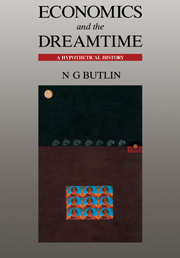Book contents
- Frontmatter
- Contents
- Preface
- Acknowledgements
- Figures
- Maps
- Tables
- Introduction
- Part I The palaeoeconomic history of Aboriginal migration
- Part II Development, structure and function of Aboriginal economy
- Part III Disease, economics and demography
- Part IV The establishment of a bridgehead economy: 1788–1810
- Part V The takeover process: 1788–1850
- 19 Introduction
- 20 British development in the long run
- 21 The hunter gatherers of empire
- 22 British, American and Macassan presence in the takeover
- 23 The major players
- 24 Aborigines and British law
- 25 The economics of takeover
- 26 The composition and demographic impact of disease
- 27 The interaction of disease with resistance, integration and submission
- 28 Conclusions
- Bibliography
- Appendix 1 Preliminary model/checklist of Aboriginal migration to Australia
- Appendix 2 NOAA depth contour maps
- Index
28 - Conclusions
Published online by Cambridge University Press: 06 July 2010
- Frontmatter
- Contents
- Preface
- Acknowledgements
- Figures
- Maps
- Tables
- Introduction
- Part I The palaeoeconomic history of Aboriginal migration
- Part II Development, structure and function of Aboriginal economy
- Part III Disease, economics and demography
- Part IV The establishment of a bridgehead economy: 1788–1810
- Part V The takeover process: 1788–1850
- 19 Introduction
- 20 British development in the long run
- 21 The hunter gatherers of empire
- 22 British, American and Macassan presence in the takeover
- 23 The major players
- 24 Aborigines and British law
- 25 The economics of takeover
- 26 The composition and demographic impact of disease
- 27 The interaction of disease with resistance, integration and submission
- 28 Conclusions
- Bibliography
- Appendix 1 Preliminary model/checklist of Aboriginal migration to Australia
- Appendix 2 NOAA depth contour maps
- Index
Summary
Given the evolution of European society, economy and technology, it was virtually inevitable by the eighteenth century that some intrusion into Australia should occur. It is possible, indeed, that successive imperial constraints on Javanese maritime activity, at least in the construction of the large vessels that the Javanese were capable of building and handling, prevented a South-east Asian intrusion earlier and on a scale larger than the trepangers visiting from Sulawesi.
One might speculate about the possibility of alternative nationalities invading Aboriginal lands. But from almost every point of view — an isolated location for convicts to deal with domestic social problems, the structure of the British domestic economy, British maritime capability, extending trading interests into the Indian Ocean and to China, the growth of whaling activity into the southern hemisphere, extra- and intra-European conflict and competition, the British inclination to settle distant areas — all made Australia a useful, if incidental, appendage to Britain.
The incoming British were representatives of one of the most recently formed of human societies in the world, colliding with one of the most ancient. The Aborigines had adapted to slow evolution and an attachment to land that was managed rather than exploited; and they had evolved strong preferences for non-material ends. By contrast, British society had been exposed to massive change over a short period, and through external influences and internal dynamics had been projected into the position of the most wealthy and technically advanced society on earth.
- Type
- Chapter
- Information
- Economics and the DreamtimeA Hypothetical History, pp. 227 - 230Publisher: Cambridge University PressPrint publication year: 1993



